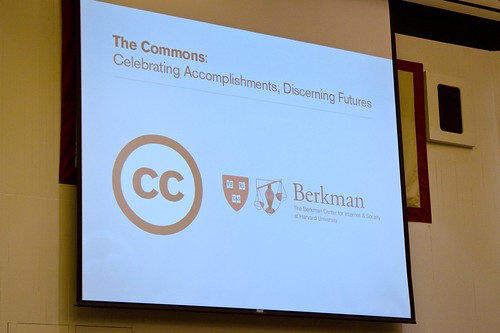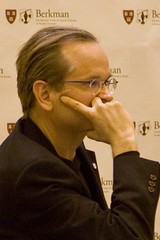Tonight the Creative Commons held a panel discussion entitled “Celebrating Accomplishments, Discerning Futures” hosted by the Berkman Center at Harvard (photos). The panel, consisting of Larry Lessig, Jamie Boyle, Joi Ito, Molly Van Houweling, shared some stories from the early days of the CC when they were deciding how they wanted to promote easier sharing - would it be a central repository, what type of licenses would be available, how would it grow beyond the U.S., etc. In addition to the anecdotes, there were several parts I found interesting:
- Joi Ito mentioned RDFa as a way to build CC metadata into xhtml/xml for content discovery. Sounded like a possible way to deliver on the "machine" part of the "human", "legal", "machine" versions of Creative Common licenses. (With the caveat that I'm always skeptical of semantic web projects, but hope to be wrong.) There is a microformat, RelLicense, that seems potentially useful but I'm not sure if it could indicate that it should be attached to linked media (an mp3, for example) that is not the current URI.
- Another point made was the effective way to get people to care about the CC is by lowering the barriers to sharing. Simply trying to convince people that they should license content in an open way often falls on deaf ears, unless it solves a problem they are facing. And when asked about commercial publishers Ito said (if I remember correctly) they were more likely swayed by seeing that opening up content lead to making more money or being more effective, and gave an example of mangas in Japan being remixed & re-released.
- The discussion left me thinking about how much for granted I take it in the software world that there are the mechanisms (GPL, APL), tools (code hosting) and social norms (OSS contributions are respected) for producing open software. That in so many other arenas there is far less history of appreciating the "option value" of openness and the possibilities that come from that freedom. </ul>

